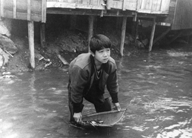Men Are All Brothers
(“Ningen mina kyodai: Buraku sabetsu no kiroku”) 1960 / B&W / 16mm (orig. 35mm) / 60 min
1960 / B&W / 16mm (orig. 35mm) / 60 min
Director: Kamei Fumio
Assistant Director: Kusunoki Tokuo
Photography: Kikuchi Shu
Sound: Ohashi Tetsuya
Music: Nagasawa Katsutoshi
Narrator: Miyata Teru
Original idea: Sugiura Minpei
Producers: Matsumoto Torizo, Ono Tadashi, Kimura Shigeo
Production Companies: Japan Document Film, Geijutsu Eigasha, Matsumoto Productions
Source: Japan Document Film
6,000 “buraku communities” accounting for three million people in Japan still suffer the anguish of groundless discrimination at a time when rocket ships fly into outer space. This film was produced to make those who believe that such discrimination is natural to reconsider their opinions by showing the undiluted reality of suffering to the many Japanese who are completely unaware of it. A crew of seven filmed for six months beginning in August 1959 in Osaka, Kyoto, Nara, Wakayama, Mie, and Nagano Prefectures, interviewing various people about such issues as marriage and job discrimination to get at the true nature of discrimination. It follows the lives of a boy who washes bins that collect scraps of solder and ashes in the river, a woman who dyes dappled cloth, people who make Japanese zori sandals, people who deal in meat products and people who make leather goods. The discriminatory structures originated in the caste system created during the feudal period in the middle ages for the political and social control of the population. Caste discrimination was repealed in 1871, but this was only a formality, and discrimination was only encouraged by the development of capitalism. A pre-war movement for equality developed into the Buraku Liberation League after the Second World War, and through lobbying was able to get some housing created for those discrimated against, but the struggle continues. Against the background of a growing consciousness of human rights, a national conference on equality petitioned the Prime Minister in August 1965 to establish a basic policy to solve various economic and social problems. As a result, the Special Measures Law for Dowa Projects was enacted in July of 1969 and regional development has continued apace, but this movie represents a significant record of the era prior to that proposal.
